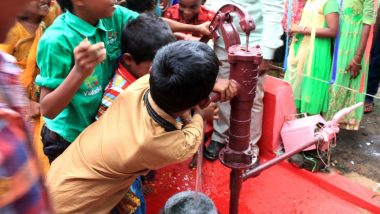Access to clean drinking water is a basic need. However, in some parts of the country, it’s a privilege. A study conducted by environmentalist Dr. Subhash C Pandey, ahead of the announcement of Swachh Sarvekshan survey 2018 report, presents some stomach-churning results about the drinking water in Bhopal. After studying 40 samples from across the city, the study concluded that potable water of Bhopal contains more bacteria than urine.
A report in The Quint said that Dr. Pandey conducted tests on “potable” water collected from railways stations, government hospitals, government college, bus stations, municipal corporation tanks, ice factories, hand pumps and other public places before arriving at a conclusion.
The Study
The samples were collected from Bhopal, Habibganj and Bairagarh railways stations; Sultania Janana, Hamidia and JP Hospital; Nadara Bus Stand; Hamidia Arts College; and the Motilal Vigyan Mahavidyalaya. The drinking water samples were collected from the city water tanker and ice samples from Avtar Water supply and Yadav water supply at Chunna Bhatti; Bairagarh Bus stand and other locations. In all, 42 samples were collected. Dr. Pandey conducted his tests in a certified lab appropriately named ‘Janta Ki Lab’ in Bhopal.
The Findings
As per the Bureau of Indian Standards (BIS) 2012, the coliform content in bacteria should be 0 MPN in 100 ml, less than 0.3 mg in litre; heavy metal and Total dissolved solids (TDS) should not be more than 500 mg per litre.
As per his findings, most samples contain coliform bacteria 1,100 to 2,400 MPN. TDS like inorganic salt such as calcium, magnesium, potassium, sodium, bicarbonates, chlorides and sulphates, were 495 mg to 772 mg per litre.
The presence of the contaminants in the water doesn’t bode well for the health of the citizens; drinking the water could cause stomach-related diseases, waterborne diseases, blood pressure issues, headaches and cancer. In addition to this, exposure to the water can also lead to skin-related diseases and hair fall.
The Reasons
Two major reasons could have led to such high levels of contaminants and bacteria in Bhopal’s water: lack of proper maintenance of water tanks, pipelines and sewage pipelines; and contamination of the lakes that supply water to the city.
The environmentalist, on his part, intends to present his findings and reports to the concerned departments so that they take punitive action on time, lest it causes an outbreak of water-borne diseases. He also plans to appeal to the National Green Tribunal (NGT) through a PIL on the basis of his report.
What The MP Pollution Control Board Says
PS Bundela, regional officer at the Madhya Pradesh Pollution Control Board, told The Quint: “The board has not received any complaint regarding contamination of water by the resident. We can only initiate a probe or test water if anyone reports the matter.”
On being asked why no surveys were carried out, he replied, There is no fixed schedule to carry out surveys and I don’t remember when the last testing of water samples was conducted.”
West Central Railway Manager Shobhan Choudhury initiated a probe and sought a report from Pandey. Appallingly, the mayor of Bhopal Alok Sharma was oblivious to the issue “I’m not aware of that fact and I don’t know much about it. Neither have I received any complaint from the resident nor by the corporation officials over impure water supply.”
(The above story first appeared on LatestLY on Jun 05, 2018 06:23 PM IST. For more news and updates on politics, world, sports, entertainment and lifestyle, log on to our website latestly.com).












 Quickly
Quickly


